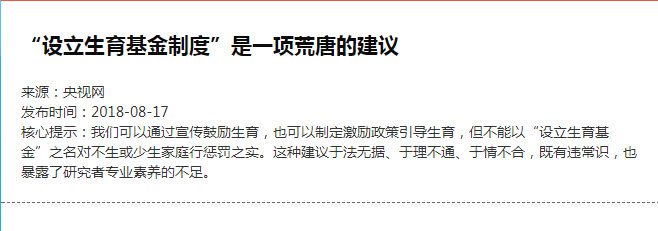How did the strange theories of paying others to raise children and not having children to pay more taxes come from?

These days, the debate about giving birth is moving towards the best part of a new wave.
First, Xinhua Daily published an article suggesting the establishment of a fertility fund system, suggesting that citizens under the age of 40, regardless of men and women, must pay a certain proportion of their wages to the fertility fund every year. If a citizen has not given birth to a second child, the account funds will not be withdrawn until retirement.
The CCTV Network issued an article questioning the proposal to establish a fertility fund system.
Netizens have not finished complaining about this proposal, and today, Hu Jiye, a professor at China University of political Science and Law, added fuel to the fire: in the future, we can not only set up a fertility fund system to encourage childbirth, but also levy a "social dependency tax" on dink families.
He said: the reason why the Chinese nation is able to stand among the nations of the world is that it has gradually formed a culture of "unfilial piety has three, no queen is great". "Fertility culture is a carrier of the traditional excellent culture of the Chinese nation, first of all, in terms of culture." we should encourage it.
He said, for example, that if a man in a family does not have children, he will not be able to enter the ancestral temple.
These suggestions met with merciless complaints from netizens. In the face of doubts, Hu Jiye, a professor at the China University of political Science and Law, also responded: he said that the establishment of a fertility fund to encourage childbearing was set up by the social support payments collected by the state for so many years, and the money could no longer be paid by the common people; as dink families need other people's children to support them in their old age, they should not be encouraged and encouraged.
However, some netizens still do not buy it, interpreting these suggestions as paying others to raise children and paying more taxes if they do not have children. They believe that it is personal freedom to have children or not, so why should they pay more if they do not have children? And why do you have to pay others to raise children on your own?
/
The outlook for the population is not optimistic, and the policy of encouraging fertility falls short of expectations.
The emergence of these "strange theories" to stimulate fertility is inextricably linked to the fact that the future of China's population is not optimistic.
The National Bureau of Statistics announced earlier this year that 17.23 million people were born on Chinese mainland in 2017, a decrease of 630000 over the previous year.
To make matters worse, according to the 2010 census data, the number of women during the fertility boom in China will decrease by about 40% in the next decade. Zhang Chewei, vice president of the China population Society, said that China's fertility rate is falling too fast, and the aging rate is the fastest in the world.
A decline in the birth rate will lead to an ageing population and a continued decline in economic vitality, which in turn may further curb fertility levels.
Demographer Yao Meixiong judged that in the future, China's population will show a structural distortion of serious fewer children superimposed by rapid aging and an imbalance in the sex ratio of the marriageable population. this will lead to reduced labor supply, weakening consumption and innovation capacity, increased pressure on providing for the aged, insufficient power for economic development and other problems.
It can be seen that whether people have children or not has affected the development prospects of the country. People's Daily's overseas edition recently wrote that "giving birth to children is not only a family matter but also a state affairs encouragement policy cannot draw cakes to satisfy hunger." The article points out that China has achieved great development by relying on a huge demographic dividend, and in the face of low fertility, the government should take more targeted measures to meet the people's yearning for and pursuit of a better life.
As a matter of fact, the policy of the central government has been following up on encouraging childbirth, and the signal is becoming clearer and clearer. From a single second child to a full second child, and then a few days ago, the Central Committee proposed to formulate national standards for family planning assistance and subsidies.
What is dramatic, however, is that the top designers have frequently stated that they are liberalizing fertility, and there are still places where birth restrictions are being implemented. A few days ago, Zhecheng County, Henan Province, said that it will levy social support for three children, which is mainly for families with three children or more, and the levy standard is three times the net income of husband and wife in the previous year.
Although the policy continues to unbind, the effect is not very satisfactory. The number of newborns in the first half of 2018 fell by about 15% and 20% compared with the same period last year, according to local health and family planning commissions. This means that the number of births in 2018 will be much lower than in 2017.
/
Why on earth don't people want to have children?
First of all, people are less willing to get married. According to the Ministry of Civil Affairs, the national marriage registration rate fell by 7% last year, the fourth consecutive year of decline. I don't even want to get married, and there are even fewer people who want to have children.
To investigate the reason, the high housing prices are naturally inextricably linked. It is reported that housing prices near key primary schools in Yinchuan have soared to 10000 yuan per square meter. Young people born in the 1980s and 1990s cannot afford to buy a house and cannot enjoy the educational resources and medical resources of the school district, which will naturally affect their desire to have children.
What needs to be considered is the cost of raising children. A few days ago, an article entitled "half a year's salary can't support a child's summer vacation" was read on the screen, and the cost of various travel studies, interest classes, and cram schools for children during a summer vacation was as high as nearly 30,000 yuan. Many people can't help but retweet it with a sentence: "I really can't afford it!" A media survey found that it is normal for a family to spend ten thousand yuan for their children during the summer vacation.
In addition to these economic reasons, studies have shown that the improvement of women's education, the independence and improvement of women's economic status, and the increase of fertility are contradictory. The more educated women are, the more likely they are to have fewer children.
/
A shift in the issue:
How to pay for whether or not to be born, how to encourage and how to encourage?
The fight over having a baby has changed the focus for several rounds. From a few years ago, whether to liberalize the birth of a second child, to whether or not to fully liberalize the second child, and up to now, whether or not to fully liberalize childbearing has also entered the field of public opinion.
However, the more persistent debate now is how to use economic means to boost the fertility rate, which is still low in the face of loose policy. And where does the money for boosting come from? Should we use the existing state finance or let citizens "crowdfunding" to raise children?
Source: People's Daily, Xinhua Daily
Wonderful content
- Prev

Rational utilization of overgrown branches in bonsai
Long branches refer to strong branches that sprout from latent buds on perennial old branches. it is originally a professional term for fruit tree planting, generally referring to the weak, fragile, not long branches of herbaceous plants, but very tender, weak, poor growth, many.
- Next

Taiwan Bonsai in its Own Form
Taiwan potted plants are influenced by both Lingnan School and Japanese potted plants. They are different from the Southern School's "storing branches and cutting stems" and the Northern School's "pangan zao pian". They advocate simplicity, vigor and elegance. Common tree species are: black pine...
Related
- Wuhan Hospital Iron Tree Blooming Result Was Instantly Frightened by the Gardener Master
- Which variety of camellia is the most fragrant and best? Which one do you like best?
- What is the small blue coat, the breeding methods and matters needing attention of the succulent plant
- Dormancy time and maintenance management of succulent plants during dormancy
- Minas succulent how to raise, Minas succulent plant pictures
- What are the varieties of winter succulent plants
- How to raise succulent plants in twelve rolls? let's take a look at some experience of breeding twelve rolls.
- Attention should be paid to water control for succulent plants during dormant period (winter and summer)
- Watering experience of twelve rolls of succulent plants
- Techniques for fertilizing succulent plants. An article will let you know how to fertilize succulent plants.

